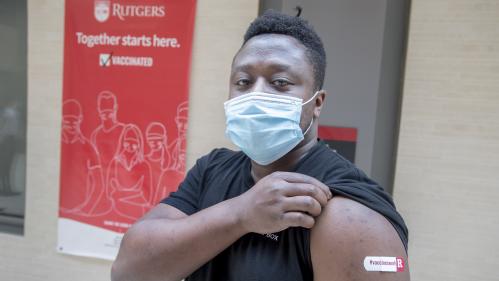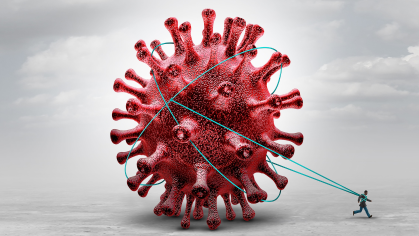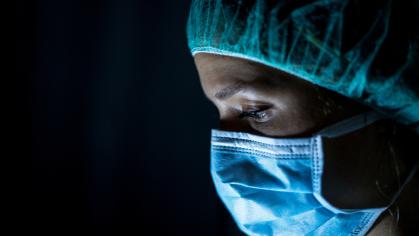Why It's Important to be Vaccinated at Rutgers

As Rutgers welcomes faculty, staff and students back to campus in the midst of the COVID-19 Delta variant surge, the push is on to get the university community vaccinated in time for the fall semester. Rutgers Today sat down with Vicente Gracias, senior vice chancellor for clinical affairs at Rutgers Biomedical and Health Sciences who has been at the forefront of the university’s response to the pandemic, to discuss the rapidly spreading variant, the incredible success of COVID-19 vaccines, and his message to those who haven’t yet chosen to get vaccinated.
What is the benefit of having the Rutgers community as vaccinated as possible?
When we weigh the benefits of having the Rutgers community vaccinated, the most important part of the assessment really is what is the overall reduction of risk and what is that risk? We now know that essentially out of 104,000 vaccinated individuals, possibly 100 will become sick and of those 1 will die. So, if we actually look at the community of ours of around 100,000 people, if we all vaccinated ourselves, we can really reduce the risk of death to almost nothing.
How are vaccinating efforts going so far at Rutgers?
They are going very well across our community. President Holloway noted earlier this week that we have over 95% compliance among our students, which is great progress. Additionally, we extended our vaccination requirement to our 8,600 employees in health care and public safety positions, where we now have a 97% compliance rate. Finally, our overall faculty and staff vaccination-upload rate is approaching 80%. All of these numbers combined tell us that we are making great strides toward our goal to have as safe a return to Rutgers as possible.
Do you have a message to share with anyone who is hesitant or concerned about getting the vaccine?
For those who are concerned or hesitant about getting the vaccine, what I would share with them is that normally, because there are such few patients that enrolled in studies, it takes a long time to study the effects of many medications or drugs. This has not been the case for the COVID-19 vaccines. There have been several large clinical trials across the country and world that have demonstrated that the vaccines are just about 100 percent effective against hospitalization or death from COVID-19 and serious side effects have been extremely uncommon. We have also been able to look at the real-world performance of the vaccines over the last couple months in what has become one of the largest biological studies ever performed as we vaccinate hundreds of millions of people and we are seeing very, very few severe side effects in real time. This doesn’t mean that we do not need long-term studies, but it does mean that we are confident these vaccines are safe and they are saving lives.
What is a breakthrough infection?
The term “breakthrough” is best understood in terms of the ability for us to create a line of defense as we have done with these vaccinations and then the virus breaks through that defense. As the virus breaks through that defense, and especially when it's able to work by infecting those who are unvaccinated, it has an enormous amount of exposure to our DNA and it starts to probe us for weaknesses in our immune system. Those viruses that survive will spread faster and will then overwhelm those that don’t. It is “survival of the fittest” at the viral level, as they mutate inside us. Why are we giving them an advantage?
What’s different about the Delta variant and what does that mean for the unvaccinated?
The problem with Delta variant is twofold: one is the increasingly contagious nature of this mutated variant and the other concern is that these mutations will continue. Right now, we know that Delta has an incubation period of three to four days as opposed to six to seven days for the type that we were battling a year and a half ago. Because of this, our testing and isolation methods that we used last year may not work as well against Delta. The second impact that has changed is that the viral load is enormously high with Delta – 1,000 times higher than the original virus, which means that in fact your exposure time to get infected is in seconds NOT minutes
How are the vaccines performing against the Delta variant?
Currently we believe that the Delta variant is covered by the vaccines and effectively reducing the risk of dying from Delta variant contagion. There is not a lot of data that says that there should be boosters, although that may be necessary in certain high-risk groups, like the elderly.
The bottom line is the vaccines work. According to recent CNN analysis of CDC data, more than 99.99% of people who are fully vaccinated against COVID-19 have not had a breakthrough case resulting in hospitalization or death. As of August 2, more than 164 million people in the United States were fully vaccinated against COVID-19, according to the CDC. Fewer than 0.001% of those individuals — 1,507 people — died and fewer than 0.005% — 7,101 people — were hospitalized with COVID-19.




